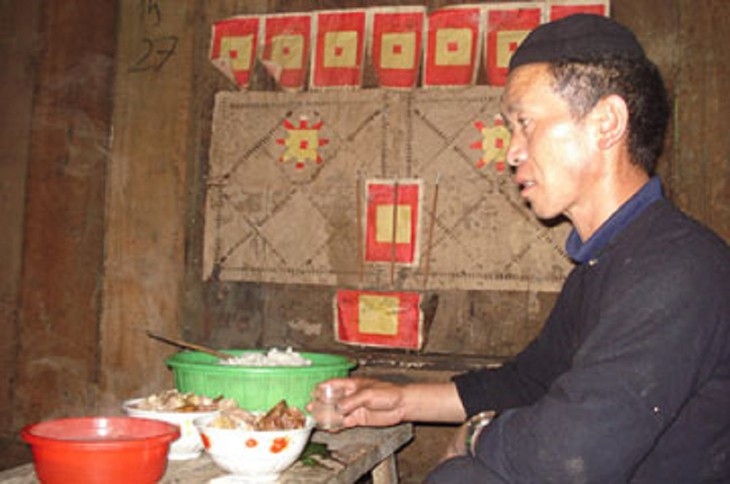Hung Dai Ky, Deputy Director of Ha Giang province’s Culture Center, says parents choose a date for their new-born child’s naming ceremony and invite all the family members.
“A grandfather or uncle of the child conducts the naming ceremony on three mornings. Offerings should include a chicken and an egg, among other things. He reports to the ancestors a new family member and asks their permission to assign the baby a name,” explains Ky.
The naming ceremony begins in the early morning with a prayer to the house spirits. The offering depends on the family’s financial condition and whether it’s a first or second child. If it is a first child and the family can afford it, they prepare a pig and many chickens and invite the maternal family to attend the ceremony.
“They prepare a pig and a couple of roosters and hens for the worship of the house spirits. They burn paper in the room of the newborn baby to inform the spirits and ancestors of the baby and his or her name and pray to them to bless the baby,” notes Giang Seo Ga, former Director of the Center for Culture, Sports and Communications of Sapa town, Lao Cai province.

Different Mong branches have different naming procedures. For example, the Mong in Van Ho district, Son La province, invite a shaman to conduct a ceremony to call the spirits.
“First parents pick a name for their baby. Then they invite a shaman to organize a ceremony. They prepare a hen for a ritual to inform their ancestors of the new family member. They place a rooster and a hen at the front door for rituals to pray to their ancestors and deities to give the mother lots of milk to feed her baby. The rituals are accompanied by a gong performance. If the family can afford it, they will prepare a big meal for the ceremony,” says Trang A Lu of Hua Tat hamlet.
According to Giang Seo Ga, during the baby naming ritual, food is placed on the altar for the ceremony, then the guests are invited to have a meal.
“Guests bring gifts for the baby. Grandparents, uncles, and aunts might give silver coins. Other relatives give baby clothes and diapers and may contribute some food to the meal,” says Ga.
The Mong continue to preserve their ritual of assigning a name to a baby as it marks the existence of a new person in the family.
A cloudy and frozen land
Ta Xua, Hong Ngai, Hang Dong and Hang Chu are well-known places in the mountain district of Bac Yen, Son La province, which are named in the famous short story “Husband and Wife A Phu” by late writer To Hoai. In recent years, these localities have become favourite destinations of photographers hunting for clouds, frost, and the local specialty Shan tuyet tea.
Hanoi works to make its intangible cultural heritages more welcoming
NDO – Hanoi is now home to 18 heritages which have been recognised as national cultural ones. Over the past recent years, the municipal Department of Culture and Sports has coordinated with the local authorities to take measures to safeguard and promote the value of these heritages, turning them into tourist products which have benefited local residents.









